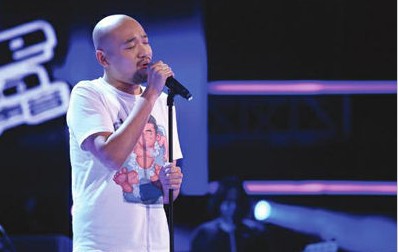

 |
| Li Daimo [File Photo/Ent.china.com.cn] |
A singer, made famous by a popular television talent show, was detained in Beijing on Monday night for drug use, the police confirmed on Tuesday.
Beijing police arrested six suspects, including singer Li Daimo, who were taking drugs at Li's temporary home in Sanlitun, Chaoyang District.
Police detained two other suspects at a hotel in Fengtai District.
Urine samples of the eight suspects all tested positive for amphetamines. They admitted their illegal drug use, according to police.
The case is under further investigation.
Li, 25, comes from northeast China's Heilongjiang Province. He was in the first season of "The Voice of China", a singing competition that Zhejiang Satellite TV aired in July 2012.
The record company that Li belongs to issued a statement on Tuesday's night following Li's detention, saying that they "deeply regret" about Li's behavior. The company apologized to Li's fans as well as the general public on his behalf in the statement.
The exposure of the scandal made a splash around Chinese social media, triggering a flurry of scathing comments on Sina Weibo, a Chinese equivalent of Twitter.
Many netizens found it hard to believe that Li, one of the most popular contestants at the Voice of China, took drugs.
"Even the best voice could fall for the bait of drugs," said a netizen on Weibo.
Li's fall from grace is just another in China's show biz that has been marred by a host of drug-taking scandals in recent years.
In April 2011, Hong Kong actor Max Mok was arrested in Beijing for taking drugs, only three months after the arrest of Chinese rock singer Xie Tianxiao for drug use. The following year, Chinese actor Zhang Mo, son of famous actor Zhang Guoli, was found using drugs in his villa.
The general manager of a Chinese culture communication company said on condition of anonymity that some celebrities take drugs to stave off their psychological woes.
"The self-worth of many stars in the show biz hinges on applause from the public, and they suffer from spiritual emptiness in their lives from time to time," said the manager.
More, taking drugs was regarded as an "avant-garde" lifestyle and a symbol of high status in the entertainment circle, he added.
Man Wenjun, a Chinese singer, said that his life plunged to bottom when he was caught taking drugs a few years ago, which stymied his career.
"I used to dye my hair so that people would not see my hair graying on stage. After my life was ruined due to taking drugs, I was afraid of performing in public and simply stopped hair dyeing," Man said in review of his infamous drug scandal in 2009, adding that he tried to "evade the crowds" amid mounting criticism.
Although Man has made a comeback, he said it is not easy for stars like him to regain trust from the public.
Celebrities' drug-taking behavior could easily cast a negative impact on the public, particularly on their fans, thanks to their "charm" and ensuing demonstration effect, said Zhou Xiaozheng, a professor at Renmin University of China.
Xia Xueluan, a sociologist at Peking University, said that many celebrities have taken pains to get what they own today, and it is necessary to cherish it.
"They should not only show glorious images on stage, but set good examples for the public off stage," Xia said.